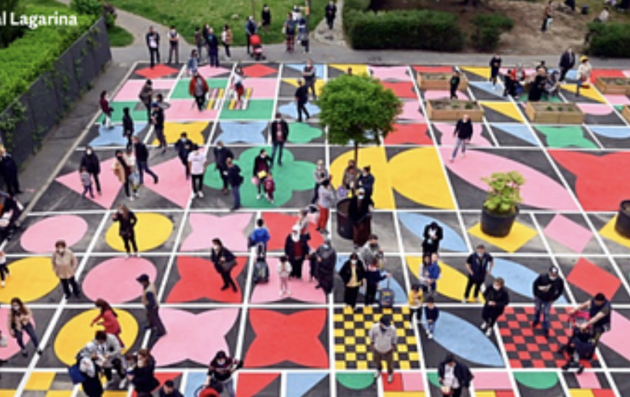Date of label : 29/10/2024
-
Milan , Italy
-
Size of city : 1.371.850 inhabitants

A vibrant and colorful pedestrian street scene, taken from an elevated perspective.
Summary
Piazze Aperte – a citywide tactical urbanism programme – was developed by Milan (IT), with the support of AMAT-Municipal Agency for Mobility and Environment in collaboration with Bloomberg Associates, and the Global Designing Cities Initiative. The project enhanced public spaces as community hubs, expanded pedestrian areas and promoted green mobility to improve the environment and quality-of-life of citizens. Piazze Aperte adopts the approach of tactical urbanism to bring public squares back to the centre of neighbourhood life, as places where people can connect. Since 2019, stakeholders have collaborated in the design, development and implementation of this initiative, which has spread across Milan.
The solutions offered by the Good Practice
Piazze Aperte supports Milan’s 2030 planning goals for urban regeneration, environmental sustainability and sustainable mobility. The Piazze Aperte initiative implements participatory actions with citizens through Collaboration Pacts, following the principles of shared administration, as part of the co-design process activated between Milan, its citizens and local actors.
In 2019, Milan launched the first public call “Piazze Aperte in ogni Quartiere” to identify new city spaces to be transformed. It received more than 60 proposals from citizens, associations, foundations, private entities, educational institutions and third sector entities, leading to the creation of over 40 Piazze Aperte - allowing one Milanese in two to have a new public space within a 15-minute walk from home.
The second call “Piazze Aperte per ogni Scuola” in 2022, focusing on public spaces in proximity to educational institutions, attracted 87 proposals with about 250 educational institutions now interested (approximately a third of the schools in Milan).
These initiatives lead to higher social cohesion by encouraging citizens to contribute to urban improvements.
Building on the sustainable and integrated urban approach
Piazze Aperte enables cities to drive urban change through a comprehensive approach, involving citizen participation and collaborations with local stakeholders. It does this using an innovative tool for grassroots action called ‘tactical urbanism’, which promotes relatively quick and cost-effective interventions to enhance public spaces and also the implementation of long-term strategies to increase the livability of neighbourhoods.
Citizens are able to immediately see the impacts and new opportunities of open spaces, and actively collaborate in their upkeep. The temporary and inexpensive nature of the process also allows for reversible testing of solutions before investing time and resources in permanent changes.
The process encourages effective collaboration between schools, caregivers, associations, other stakeholders and local government. This promotes community engagement through shared management, and by involving students and teachers in the transformation process through the creation of specific participation programmes.
Based on participatory approach
Piazze Aperte relies on effective collaboration between the public administration and the community. Intervention areas are identified through Public Calls, leading to a co-design process that addresses the different local contexts and needs of neighbourhoods, and responds with specific interventions.
Each open square is therefore unique, and closely linked to its neighbourhood and/or school, and activities organised by the community. Collaboration Pacts provide written agreements through which the Municipality works with citizens, informal groups, associations, schools, committees, foundations, and companies, to develop and manage the Piazze Aperte as urban common goods.
What difference has it made?
Piazze Aperte has transformed former parking lots and road intersections into more livable spaces by creating new bike lanes and pedestrian zones, and more 30 km/h speed limit zones, to encourage the adoption of sustainable modes of travel. The project has fostered deeper ties between the city administration and city residents.
The project published two calls asking groups of citizens to propose sites for the co-creation of new public spaces (Piazza Aperta). In the first open call (2020), 800 inhabitants, 200 non-profit associations and social cooperatives,10 institutions, 9 neighbourhood committees, 8 social streets,17 schools, 72 businesses, 45 private entities, and 8 religious institutions participated, with 45 out of 65 proposals implemented.
The second open call (2023) involved 250 schools and 600 groups, including neighbourhood associations, social cooperatives and parent associations. The interventions proposed were 60 new squares, 73 sidewalk extensions or pedestrian areas, 57 speed moderation interventions, 43 re-activated pedestrian spaces, and 34 cycling routes. Four interventions have been made, and the goal is to implement three new interventions every three months.
Why this Good Practice should be transferred to other cities
The Piazze Aperte initiative aligns with many policy goals that are common to all European cities:
- UN Sustainable Development Goals (SDGs): SDG 3 (Good health and well-being), SDG 11 (Sustainable cities and communities), and SDG 13 (Climate action).
- EU Cohesion Policy.
- The New Urban Agenda.
- Territorial Agenda 2030.
Piazze Aperte stems from Mission 8 of the Milan Strategic Instrument on Public space planning and housing, and also supports city, regional and national legislation on sustainable mobility.
The tactical urbanism approach can be universally applied, to help speed up processes and mediate conflicts towards the transition to an increasingly resilient, inclusive, safe and human-scale city. It places citizens at the centre of urban transformations by involving them in the co-creation and co-implementation of services and projects in their neighbourhood, with the support of local stakeholders.
The concept and objectives of Piazze Aperte are straightforward, and being versatile can be adapted to the specific legislative codes and contexts of different countries. The project’s motto is ‘lighter, quicker, cheaper’, factors that mean the practice can be easily re-adapted, re-shaped and re-used in other cities.
One of the key success elements is the Collaboration Pacts: quick and easy agreements drafted with citizens for the co-maintenance of the new squares. Cities that want to do the same should investigate what their tools for participation are, and strengthen their role. In this way they will enable effective collaboration with bottom-up initiatives, which are the real driving force behind Piazze Aperte.
